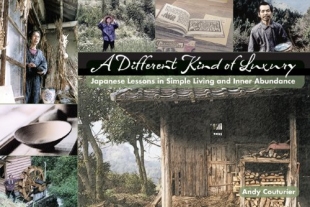In a Nutshell: In the West, our lives are diminished by hurry sickness, overwork, the constant pressure of deadlines, stress on the job, little time for personal relationships or leisure, and a nagging sense that there must be a simpler and more fulfilling way to live. In this gem of a paperback, Andy Couturier profiles eleven men and women in the mountains of rural Japan who are artists, philosophers, and farmers. They lead simple lives immersed in the conviviality of nature, art, contemplation, community. They have time to spare and are content. As these interviews reveal, spirituality and creativity are usually the animating forces behind this lifestyle.
About the Author: Andy Couturier is an essayist, poet, and writing teacher. He lived in Japan for four years, where he taught, was a journalist, and worked on environmental causes. Couturier has studied Buddhist meditation and other Asian philosophical traditions. The essays in this wonder-inducing paperback are based on his popular articles in The Japanese Times.
Sum and Substance: Here is a list of the eleven extraordinary men and women profiled in this book:
• San Oizumi, potter, anti-nuclear organizer, anarchist, community educator, father
• Osamu Nakamura, woodblock carver, cook, storyteller, hand bookbinder, traveler, craftsman
• Atsuko Watanabe, community activist, mother, homeopath, seeker, anti-nuclear and recycling educator, self-sufficient farmer, town council member
• Kogan Murata, bamboo flute player, storyteller, rice farmer, student of Zen
• Asha Amemiya, self-sufficient farmer, batik fabric artist, mother, author, illustrator
• Akira Ito, painter, Yoga practitioner, student of theoretical astrophysics, children's book writer and illustrator, hand bookbinder, woodblock carver, prose poet, Chinese table harp player
• Wakako Oe, organic farming mentor, puppet carver, intuitive painter, botanic sculptor, calligrapher
• Gufu Watanabe, collector, potter, amateur botanist, Indian cooking, afficianado, clay sculptor, home canner, diarist, illustrator
• Koichi Yamashita, school teacher, rice farmer, writer, professor Hindu philosophy, father, anti-nuclear community activist, tea plantation laborer
• Jinko Kaneko, painter, chef, restaurant proprietor, hand dyer, felt artist, flower gardener
• Masanori Oe, author, filmmaker, translator of sacred texts, community educator, philosopher, interpreter of indigenous traditions, organic farming mentor.
Among the many fascinating themes covered by these men and women are the search for a more reasonable and affectionate way to be in the world, the limitations of a group-oriented society, the pleasure of using one's hands to provide for one's needs, the satisfaction of living a life of reduced desires and reduced consumption, the benefits of laziness, a love of beauty, a reverence for the natural world, and an awareness of death.
Quotes to Go:
• Luxury
"But then I think that perhaps such a life — very little production, very little consumption — might be an important part of the solution to the world ecological crisis. As we look out on the clouds on the far mountains, I ask Osmu Nakamura, 'Do you feel that you are living a life of luxury?' 'Luxury? No, not luxury. It's an ordinary life. But I do feel an abundance, a sense of plenty. A hundred years ago, I would not have been able to choose what kind of life to live. I feel very lucky to be living in this age.' "
— Andy Couturier
• Pleasure
"People of our modern era are focused on 'having fun.' Before, humans did what they needed to do, and if pleasure came their way, they welcomed it."
— Atsuko Watanabe
• Tradition
"The good things of the past, that's what we must preserve. They have passed through the hardships of history to become a tradition, and we who are alive today must treasure them, and take care of them for the future."
— Akira Ito
• Time
"There's a term in Japanese, binbo ryoko, which is essentially traveling on a shoestring, but a more literal translation would be 'poverty travel,' in which one of the main points is to use hardly any money at all. . . . It allowed them to have a lot more time. When people say 'time is money' they are usually admonishing you not to waste your time, because then you would be losing money. But of course the inverse is true (you) had a lot of time there because (you) didn't waste money."
— Andy Couturier
• One Life
"You see the ordinary way of thinking is that the human body and the rice plant are totally different, separate. But something I realized recently is that the human body and the rice plant are not separate entities. If you make a thorough investigation of the question, you will see that there are not many lives, there is only one Life. Both rice plants and humans are made up of the same substances, the same atoms and molecules. A rice plant starts small, grows larger, produces its seeds, dies. It is in possession of a life, just like a human. Humans aren't higher up. But this is not something I think; it is something I directly feel."
— Koichi Yamashita
